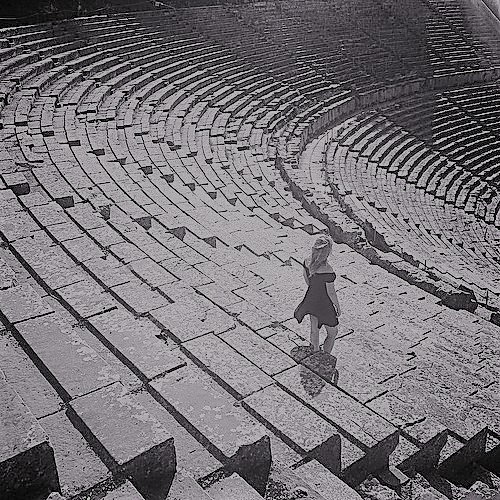A few months ago, I read the book “Mr. Churchill’s Secretary,” a fictional novel by Susan Elia MacNeal. I have read twenty books since then, but there is one scene about which I can’t stop thinking.
It haunts me.
In the first chapter of the book, a woman named Diana is coming home from where she works as a secretary for Winston Churchill. She exits the car of a stranger who has given her a ride home. When she gets out, a man is standing there in a dark mask. He tells her to turn around and put her hands on the car hood. She complies despite the fear that something is wrong. “Without preamble, she felt the hot shock of the metal blade as it pierced through her flesh and could hear the tearing as it went through cloth and skin and muscle” (MacNeal 8). She dies there, in a puddle of rain and blood, without trying to run or fight back.
It was about that time that I stumbled on the history of Boudicca, Warrior Queen of the Celts.
Boudicca was a queen of the Iceni Celtic tribe in 47 A.D. Briton was under the rule of the Roman Empire, and Boudicca’s husband was the Icenian King Prasutagus. Although he was the King of the Celts, he was also a “client king” of the Romans, and therefore had full Roman citizenship. By extension, his wife would also have been a part of the ruling class of Rome (Collingridge 173-178).
King Prasutagus died, and instead of passing his kingdom to his daughters which had been his wishes, Rome decided that the kingdom was rightfully theirs. They beat Boudicca and raped both of her daughters, the very women that King Prasutagas thought would be the queens of his kingdom. The bodily harm and the rapes were seen as great insults in both the Roman and Celtic cultures. But they were designed for one thing: to terrify both Boudicca and the Celts into submission to the Romans.
It did not work.

After hearing of what had happened to Boudicca, the Iceni tribespeople gathered near the home of their queen, “Showing their support for their queen and their hatred of the Romans” (Collingridge 184). Roman rule was tenuous at best, with a previous Celtic rebellion squashed thirteen years previous and the tentative peace only possible through King Prasutagus’s pro-Roman stance.
Other Celtic tribes joined Boudicca and made a massive army, and according to Collingridge, “There was only one response, only one plan of action – and that was to wipe out all trace of the Romans’ polluting culture and their gross abuse of every man, woman and child in the conquered territories” (Collingridge 185). Boudicca and her army attacked and razed three Roman cities. Her army was brutal and harsh, taking the lives of thousands of Britons and Romans alike in an attempt to win back their independence and freedom.
The historian Tacitus recorded Boudicca’s statement:
“Nothing is safe from Roman pride and arrogance. They will deface the sacred and will deflower our virgins. Win the battle or perish, that is what I, a woman, will do” (Pruit).
Boudicca and her army lost in a final battle with Rome, and because of that loss, Briton was then ruled by Rome for another 350 years. Of Boudica, Dio wrote, “The Britons mourned her deeply and gave her a costly burial. The Roman conquest had brought to the Iceni misfortune that ripened into disaster after their rebellion failed. But as time passed, Britannia became an orderly and respected part of the Roman empire. It remained so for another three centuries. Boudica’s people finally won what it seems they had wanted all along: respect, peace and a government that treated them with justice and honor” (Donsbach).
Boudicca died defending her rights and doing what she thought was best.
What do these two women, one fictional and one not, have to do with one another? Both of their stories end in death and that is the very point. One died without even an attempt to fight. The other fought for what she believed in.
If I had a choice, I know which one I would choose to be.
Works Cited:
Collingridge, Vanessa. Boudica. London: Ebury, 2005. Print.
Donsbach, Margaret “Boudica: Celtic War Queen Who Challenged Rome.” HistoryNet. N.p., 09 Aug. 2016. Web. 26 Mar. 2017. http://www.historynet.com/boudica-celtic-war-queen-who-challenged-rome.htm
MacNeal, Susan Elia. Mr. Churchill’s Secretary: A Novel. New York: Bantam Trade Paperback, 2011. Print.
Pruitt, Sarah. “Who was Boudica?” History.com. A&E Television Networks, 31 May 2016. Web. 26 Mar. 2017. http://www.history.com/news/ask-history/who-was-boudica


 King Cleomenes managed to get himself to the acropolis, the central and most important part of the ancient Athenian polis, also the location of the holy temple of Athena. Weary and looking for a moment of spiritual reflection, Cleomenes, King of Sparta enters to the holiest place in the city of Athens, to pray. I imagine he opened the temple door, ready to step into the welcome cool dim within when he heard an angry female voice. An angry and powerful female voice, accustomed to being obeyed.
King Cleomenes managed to get himself to the acropolis, the central and most important part of the ancient Athenian polis, also the location of the holy temple of Athena. Weary and looking for a moment of spiritual reflection, Cleomenes, King of Sparta enters to the holiest place in the city of Athens, to pray. I imagine he opened the temple door, ready to step into the welcome cool dim within when he heard an angry female voice. An angry and powerful female voice, accustomed to being obeyed. oracular visions of the coming of Jesus Christ and the ultimate establishment of Christendom. Yet it is interesting to note that Christians of this age viewed the prophesy of the Cumae Sibyl as a frightening example of female paganism. This is a fascinating conflict, despite rejecting paganism itself, they acknowledged the power of the female prophetess. Christian scholars were convinced that Sibyl, by divine power, had foreseen the birth of Jesus and through extension rejected Roman pagan authority.“By Destiny’s unalterable decree. Assume thy greatness, for the time draws night, Dear child of gods, great progeny of Jove!”2 While the Sibyl represented a pagan belief system, medieval scholars recognized that she held a special power, especially if she foresaw the coming of their Lord.
oracular visions of the coming of Jesus Christ and the ultimate establishment of Christendom. Yet it is interesting to note that Christians of this age viewed the prophesy of the Cumae Sibyl as a frightening example of female paganism. This is a fascinating conflict, despite rejecting paganism itself, they acknowledged the power of the female prophetess. Christian scholars were convinced that Sibyl, by divine power, had foreseen the birth of Jesus and through extension rejected Roman pagan authority.“By Destiny’s unalterable decree. Assume thy greatness, for the time draws night, Dear child of gods, great progeny of Jove!”2 While the Sibyl represented a pagan belief system, medieval scholars recognized that she held a special power, especially if she foresaw the coming of their Lord. sacred womanhood is not to be underestimated. This is reflected in the very stories of the divine, contained with the feminine— a sacred looming power.
sacred womanhood is not to be underestimated. This is reflected in the very stories of the divine, contained with the feminine— a sacred looming power. “At your battle-cry, my lady, the foreign lands bow low. When humanity comes before you in awed silence at the terrifying radiance and tempest, you grasp the most terrible of all the divine powers. Because of you, the threshold of tears is opened, and people walk along the path of the house of great lamentations. In the van of battle, all is struck down before you. With your strength, my lady, teeth can crush flint. You charge forward like a charging storm.
“At your battle-cry, my lady, the foreign lands bow low. When humanity comes before you in awed silence at the terrifying radiance and tempest, you grasp the most terrible of all the divine powers. Because of you, the threshold of tears is opened, and people walk along the path of the house of great lamentations. In the van of battle, all is struck down before you. With your strength, my lady, teeth can crush flint. You charge forward like a charging storm. 


